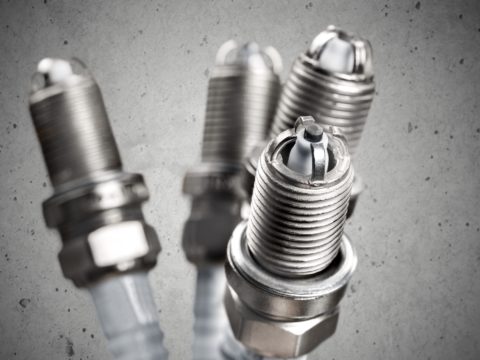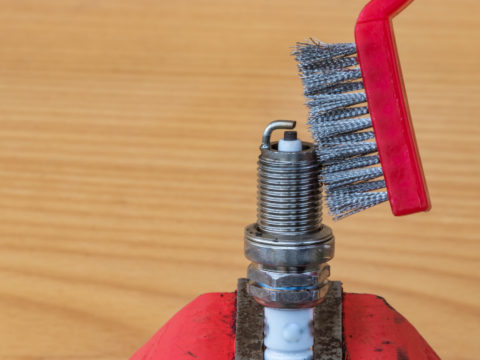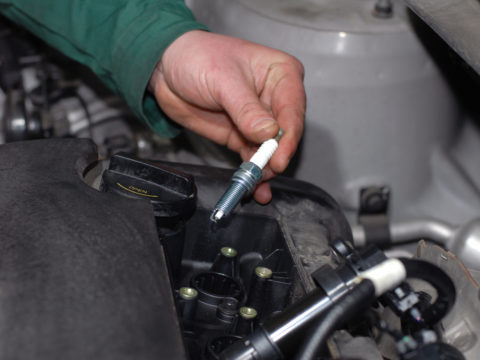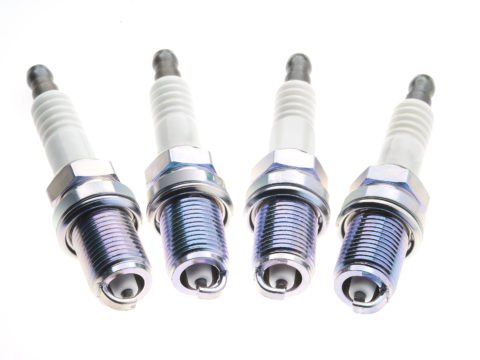Spark plugs are vital for ensuring proper engine operation in a car. However, after a while, you may notice that your vehicle’s spark plug is black and not working. This issue is called carbon build-up.
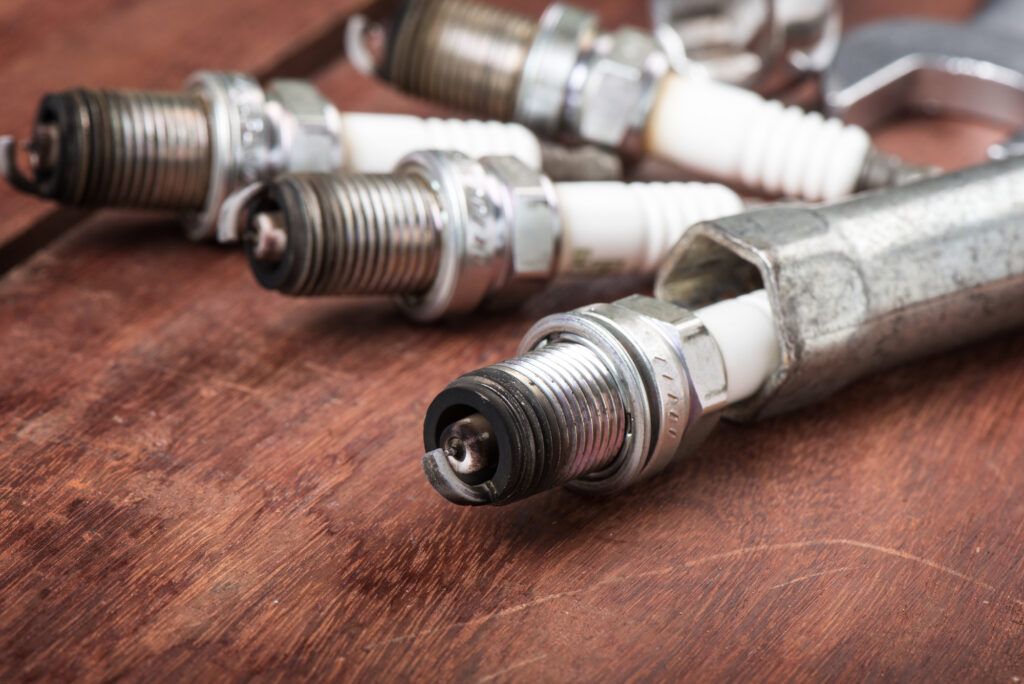
So, what causes carbon build-up? It arises when your vehicle’s fuel proportion is high, causing an uneven air and fuel mixture. This unequal mixture causes carbon build-up when firing the spark plugs.
Keep reading to learn about other causes and the necessary fixes.
Contents
Spark Plugs Diagnosis
Spark plugs are electrical devices that provide the spark needed to produce engine power by igniting the air-fuel mixture.
If you can’t tell whether your spark plugs are good or damaged, check the following when conducting a spark plug diagnosis:
- Oily spark plugs: Such spark plugs have black oily deposits on the electrodes and insulator tip.
- Broken spark plugs: These spark plugs have broken electrodes.
- Normal spark plugs: Standard spark plugs are clean and have a pre-set electrode distance.
- Carbon-fouled spark plugs: Such spark plugs have dark electrodes stemming from black soot.
- Overheated spark plugs: These spark plugs have melted electrodes due to overheating.
- Fuel-contaminated spark plugs: Such spark plugs will have wet gasoline due to engine flooding.
Consult a mechanic if you can’t accurately diagnose your spark plugs.
Is It Normal for a Spark Plug To Be Black?
No, it’s not normal for a spark plug to be black. If your spark plug is black, it means carbon has accumulated for a while. A regular spark plug is clean, and the electrodes are brown.
Fouled Spark Plug Symptoms
There are various signs of fouled spark plugs. Let’s discuss them in detail.
Increased Fuel Consumption
Increased fuel consumption is one of the indicators of a fouled spark plug. An optimally functioning spark plug burns fuel completely, thus reducing your car’s fuel consumption.
However, when the spark plug isn’t working correctly, the electrodes are either close or far from each other. This distance makes it difficult for the spark plugs to generate a sufficient spark to burn the fuel, leading to increased fuel consumption.
Mechanics often adjust the gap between the electrodes to avoid installing new spark plugs.
Slow Acceleration
You will experience acceleration problems if your car’s ignition system has an issue.
Modern cars have many sensors that signal the ignition system to fire the spark plug. So, based on your car type, the slow acceleration problem may stem from faulty signals. If this is not the case, you may have a fouled spark plug.
Spark plugs contain various materials that aid in igniting the air-fuel mixture. If these materials are fouled, the spark plugs won’t release sufficient sparks to the engine, which causes slow acceleration.
Take your vehicle to an auto shop center if your car is accelerating slowly, as there are other factors, such as bad fuel filters, which can cause the same issue.
Difficulties in Starting the Engine
If you have a problem starting your engine, you may have a spark plug issue.
Spark plugs are part of the ignition system and play an integral role in starting the engine. The spark plug generates electricity, which ignites the fuel and creates an explosion that gives the engine power to move the car forward.
However, if your spark plug is worn out, it won’t release sufficient electricity to ignite the fuel. Thus, it may take several attempts to start the engine, or you may fail to start it.
Misfiring Engine
Engine misfires arise when the engine cylinders don’t produce sufficient power due to incomplete combustion. When this problem occurs, your engine loses power, resulting in a noticeable vibration.
You must be alert to these changes, especially if your car doesn’t send a “check engine” warning.
These misfires arise if your fouled spark plug doesn’t ignite the air-fuel mixture, which unbalances the engine, leading to vibration.
Ultimately, take your vehicle to a mechanic if you’re worried your engine is misfiring.
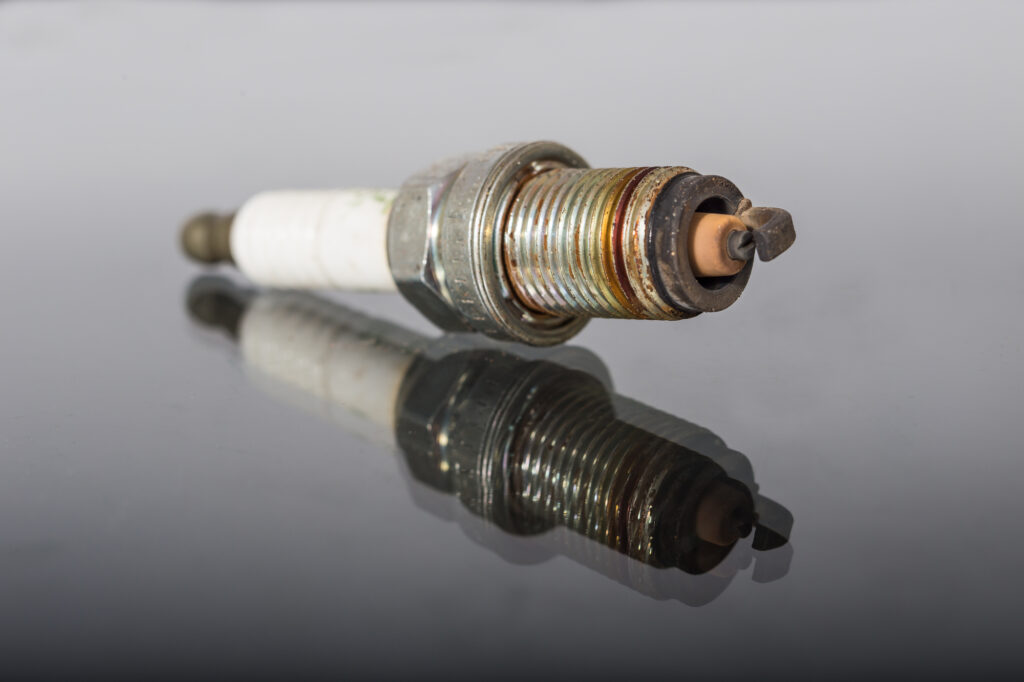
What Causes Carbon Build-Up on a Spark Plug?
There are many causes of carbon build-up on a spark plug. Here are a few:
A Damaged Fuel Injector
A fuel injector delivers fuel into the engine cylinder by controlling the injection timing and other related parameters. If this device is damaged, it affects the amount of fuel injected into the engine cylinders.
So, if your injector is faulty, it may inject more fuel than required into the engine, leading to inefficient combustion. After a while, this leads to carbon build-up on the spark plug.
A Dirty Air Filter
Every car has an air filter that filters the air before it gets to the engine, thus protecting it from contaminants. However, this filter accumulates dirt after a while, making it hard to filter air effectively.
It limits the air getting into the engine, which decreases the amount of oxygen that should mix with the fuel for complete combustion. Since there isn’t sufficient oxygen to aid in burning the fuel completely, it leads to carbon deposit on the spark plug.
Using the Wrong Spark Plug
Besides various outside factors, using the wrong spark plug may lead to carbon build-up. These spark plugs produce less ignition to burn the fuel, causing the unburned fuel to precipitate on the electrodes.
Each car has a different ignition standard, meaning the ignition output will differ. The carbon will accumulate on your spark plugs, forcing you to replace them.
The only solution is to install a suitable spark plug that meets your engine’s specifications. Some cars may even have the same engines but different spark plugs, so stick to the spark plugs recommended by the manufacturer.
Furthermore, a spark plug that isn’t suitable for a specific engine may cause engine problems.
Car Idling
Car idling is a common behavior among car owners because many believe this is an efficient way to warm the car. But this isn’t true. Car idling will not damage your vehicle, but it does cause carbon build-up on the spark plugs.
Complete fuel combustion doesn’t occur if you aren’t driving your car. It means that the spark plugs do not release sufficient spark to ignite the fuel because your vehicle is idling, leading to incomplete combustion. The unburnt carbon will be deposited on the spark plug, causing carbon build-up.
Faulty Oxygen Sensor
Every car has an oxygen sensor, which monitors the air and fuel ratio in the engine. If one item is above the required ratio, the vehicle’s Engine Control Unit (ECU) makes the necessary adjustments.
So, if your car has a faulty oxygen sensor, it sends the wrong message to the ECU, which either increases or decreases the quantity of fuel needed for combustion. This change leads to incomplete combustion and causes carbon build-up on the spark plugs.
An oxygen sensor plays a crucial role in the engine, so you should ask your mechanic to check it regularly.
How To Fix Carbon Build-Up on Spark Plug
There are many ways you can fix carbon build-up on a spark plug. Let’s discuss them further.
Clean the Spark Plug Thoroughly
Cleaning the spark plug is a cost-effective way to fix carbon build-up. You will only need a clean cloth and a quick-drying cleaner, such as a brake cleaner, for the cleaning process.
Here are the steps you should follow when cleaning the spark plugs:
- Wipe the firing tip and plug with a clean cloth.
- Spray the quick-drying cleaner on the firing end and leave it for a few minutes.
- Scrub off the carbon deposits with a wire brush.
- Blow off the scrubbed carbon deposits using an air compressor. Scrub again if you haven’t removed all the carbon.
- Check your spark plug gap and change it if necessary.
One thing to note is that the spark plug will get damaged quickly if you don’t clean it thoroughly.
Replace the Spark Plugs
Replace the spark plugs if you can’t remove the carbon deposits altogether. Follow these steps when replacing the spark plugs:
- Remove the spark plug wire: Ensure you mark the spark plug wire’s position once you remove it to ensure you install it in the right place.
- Check the spark plug electrode distance: New spark plugs have a pre-set electrode distance, but you should check them to ensure it is between 0.6 and 1.8 mm.
- Install the new spark plug: Use your hands to install the new spark plug and turn it until it tightens.
Drive Your Car at a High Speed
You may remove all the carbon build-up if you drive your car at high speed for a few minutes. Increasing your car’s speed increases the spark plug’s temperature, which burns the carbon build-up.
Clean the Air Filter
Clean the air filter after replacing the spark plugs. Dirty air filters are usually clogged, which prevents air from entering the engine. This issue limits the air in your engine, causing carbon build-up. Thus, you must replace the air filters, and the spark plugs to fix the carbon build-up issue permanently.
What Dissolves Carbon Deposits?
You will need a solvent to dissolve carbon deposits. The solvent will break down the carbon deposits at a specific temperature through the dissolution process and ensure these deposits are completely dissolved to form a solution.
Best Solvent for Removing Carbon
The best solvent for removing carbon is acetone. Acetone has a 15g/100 ml solubility at 20 degrees, making it the best carbon solvent. Other solvents include Ethyl Acetate, Ethanol, and Diethyl Ether.

